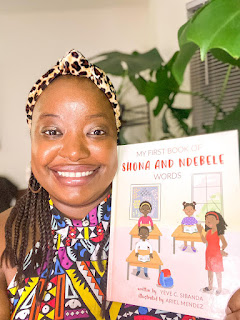More from Zimbabwe! A Children's Book about Shona and Ndebele
Just a week before, I had been discussing the need to promote African languages with Elle Charisse, creator of the Speaking Tongues podcast. On a popular language-learning app, until very recently, the only African language being taught was Swahili. I just read that Zulu and Xhosa, spoken in South Africa, will soon be taught, too.
There are some apps and websites, such as Mandla (for English speakers) and ParleAfrique for French speakers. However, they often have limited resources.
Yeve is originally from Zimbabwe, and married to a fellow Zimbabwean. However, they don't come from the same region, and hence do not speak each other's mother tongue. This is a common issue in many expatriate families. Even though she already has a busy life as an attorney in Maryland, USA, she decided to write this picture book. Yeve has a daughter, who is learning both languages. Shona and Ndebele are the two main languages of Zimbabwe.
As per Yeve's website, the book "is a multicultural picture book staged in Zimbabwe and designed to make learning Shona and Ndebele, the native languages of Zimbabwe, fun. The main character, Rufaro, takes the reader through her daily activities and helps the reader learn basic words for greetings, transportation, family members and many more. Picture books promote language development by allowing the reader to simultaneously see and name various objects."
Also as per Yeve: “African children’s books are not for African children. They are for all children. Books are an important tool in documenting culture, history, and language." Sibanda believes that we have to normalize celebrating, embracing, and learning about other cultures to build a truly global and diverse society.
Yeve is further motivated by the desire to represent Zimbabwe in a positive light and celebrate and honor her family's roots. Specifically, Sibanda was intentional about portraying a family that lives in the city and is not depicting an impoverished image of 'Africa', in the book.
Here's to many more books, both for adults and children, in the multiple languages of Africa! There is more than enough work: there are possibly 1,500 to 2,000 languages in the continent, depending on how you count!




Comments
Post a Comment
Please let me know your thoughts and questions. Also, if you feel that anything is incorrect, please let me know.
I need to moderate the comments, as in recent years there has been a spike in spam.